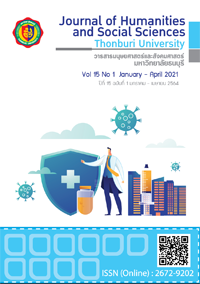The Effects of Project-Based Writing Instruction on Writing Ability of Thai EFL Undergraduate Students
Keywords:
Project-Based Learning, Writing Instruction, Writing Ability, EFL studentsAbstract
This study aimed to investigate the effects of project-based writing instruction on writing ability of Thai EFL undergraduate students and explore the attitudes of Thai EFL undergraduate students towards the project-based writing instruction. This study employed a one-group, pretest post-test design to collect both quantitative data and qualitative data. The sample of the study was 24 first-year undergraduate students from Faculty of Humanities in the first semester of the academic year 2019. Three research instruments were created to elicit the data including a pretest and posttest of writing ability, an attitude questionnaire, and a semi-structured interview. The findings revealed that after the implementation of the project-based writing instruction, students’ writing ability increased with statistical significance. Moreover, students had positive attitudes towards the project-based writing instruction. Based on the findings, it could be concluded that project-based writing instruction (PWI) could be implemented as one of the effective instructional method to enhance writing ability of Thai EFL Undergraduate students.
References
Affandi, A., & Sukyadi, D. (2016). Project-based learning and problem-based learning for EFL students’ writing achievement at tertiary level. Rangsit Journal of Educational Studies, 3(1), 23-40.
Aghayani, B., & Hajmohammadi, E. (2019). Project-based learning: Promoting EFL learners’ writing skills. LLT Journal: A Journal on Language and Language Teaching, 22(1), 78-85.
Bachman, L. F., & Palmer, A. S. (1996). Language testing in practice. Oxford: Oxford University Press.
Ballantyne, S. (2016). Project-based learning: Utilization in a Thai EFL classroom. Journal of Liberal Arts, Prince of Songkla University, Hat Yai Campus, 8(2), 47-77.
Barr, P. S., & Chinwonno, A. (2016). The effects of project-based reading instruction on English reading ability and intercultural communicative competence of undergraduate students. Journal of Education Naresuan University, 18(3), 27–44.
Beckett, G. H., & Miller, P. C. (2006). Project-based second and foreign language education: Past, present, and future. Greenwich, CT: Information Age Publishing.
Benchachinda, T. (2012). Developing English writing ability of grade 6 students using the 4 MAT system. International Journal of Social Science and Humanity, 2(6), 551-553.
Buck Institute for Education. (2019). Gold standard PBL: Essential project design elements. from https://my.pblworks. org/system/files/documents/Gold_Standard_PBL_Essential_v2019.pdf
Busciglio, D. (2016). Not so fast: The influx of American fast food in Italy and its effects on Italian youth. from http://nflrc.hawaii.edu/pebbles/prototype/175/
Ferris, D. R., & Hedgcock, J. S. (2014). Teaching L2 composition: Purpose, process, and practice. 3rded. NY: Routledge.
Fried-Booth, D. L. (1986). Project work. New York: Oxford University Press.
Graham, S., & Perin, D. (2007). Writing Next: Effective strategies to improve writing of adolescents in middle and high schools. New York: Carnegie Corporation of New York.
Hovardas, T., Tsivitanidou, O. E., & Zacharia, Z. C. (2014). Peer versus expert feedback: An investigation of the quality of peer feedback among secondary school students. Computers & Education, 71, 133–152.
Mala, D. (2017). Thai students still lag the rest. Bangkok Post. from https://www.bangkokpost.com/learning/ news/1228212/thai-students-still-lag-the-rest
Mu, C. (2005). A Taxonomy of ESL writing strategies. from http://eprints.qut.edu.au/64/1/64.pdf
Newprasit, N., & Seepho, S. (2015). The effects of a project-based learning approach on the improvement of English language skills. Journal of Applied Language Studies and Communication, 1(1), 16-51.
Poonpon, K. (2017). Enhancing English skills through project-based learning. The English Teacher, XL. 1-10.
Read, S. (2010). A model for scaffolding writing instruction: IMSCI. The Reading Teacher, 64(1), 47-52.
Richards, J. C. (2015). Key issues in language teaching. Cambridge: Cambridge University Press.
Seensangworn, P., & Chaya, W. (2017). Writing problems and writing strategies of English major and non-English major students in a Thai university. MANUTSAT PARITAT: Journal of Humanities, 39(1), 113-136.
Siritararatn, N. (2007). A development of the English oral communication course using the project- based learning approach to enhance English oral communication ability of Kasetsart University students. [Doctoral dissertation]. Chulalongkorn University.
Stoller, F. L. (2012). Project-based learning: A viable option for second and foreign language classrooms, Proceedings of the 20th Annual KOTESOL International Conference, 37-47.
Sumarni, W. (2015). The strengths and weaknesses of the implementation of project based learning: A Review. International Journal of Science and Research (IJSR), 4(3), 478-484.
Thitivesa, D. (2014). The academic achievement of writing via project based learning. International Journal of Social, Education, Economics and Management Engineering, 8(9), 2883-2886.
Van de Pol, J., Volman, M., & Beishuizen, J. (2010). Scaffolding in teacher–student interaction: A decade of research. Educational Psychology Review, 22, 271–296.
Vygotsky, L. S. (1978). Mind in society: The development of higher psychological processes. Cambridge: Harvard University Press.
Watcharapunyawong, S., & Usaha, S. (2013). Thai EFL student’s writing errors in different text types: The interference of the first language. English Language Teaching, 6(1), 67-78.
Watkins-Goffman, L., & Berkowitz, D. G. (1990). Thinking to write: A composing-process approach to writing. New York: Maxwell Macmillan International Publishing Group.
Weigle, S. C. (2002). Assessing writing. Cambridge: Cambridge University Press.
Williams, J. D. (2003). Preparing to teach writing: Research, theory, and practice. 3rded. Mahwah, NJ: Lawrence Erlbaum.
Wongdaeng, M., & Hajihama, S. (2018). Perceptions of project-based learning on promoting 21st century skills and learning motivation in a Thai EFL setting. Journal for the Study of English Linguistics, 13(2), 158-190.







